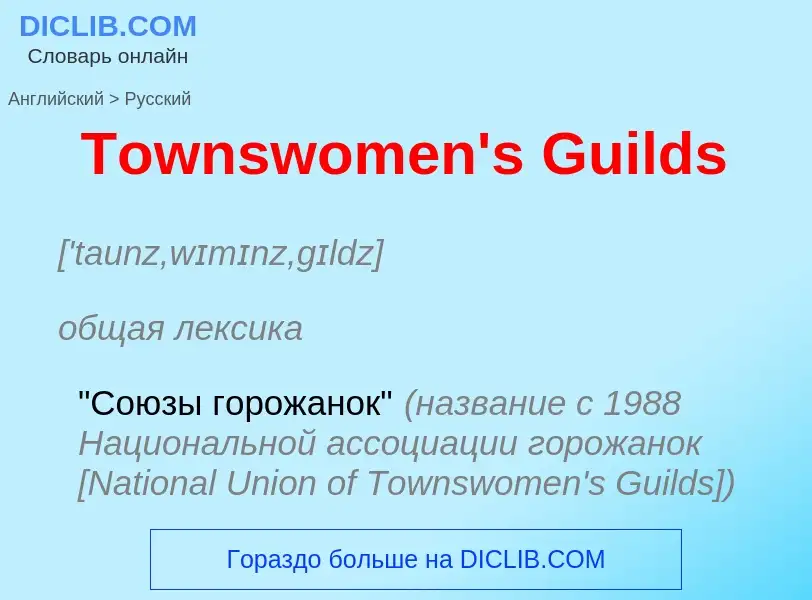Translation and analysis of words by ChatGPT artificial intelligence
On this page you can get a detailed analysis of a word or phrase, produced by the best artificial intelligence technology to date:
- how the word is used
- frequency of use
- it is used more often in oral or written speech
- word translation options
- usage examples (several phrases with translation)
- etymology
Townswomen's Guilds - translation to English
['taunz,wɪmɪnz,gɪldz]
общая лексика
"Союзы горожанок" (название с 1988 Национальной ассоциации горожанок [National Union of Townswomen's Guilds])
[,sɪtɪən,gɪldzəv'lʌndən,ɪnstɪtju:t]
общая лексика
Институт Сити и гильдий Лондона (высшее техническое учебное заведение. Основано в 1878 "ливрейными компаниями" и муниципальным советом лондонского Сити [City Corporation])
синоним
Definition
Wikipedia
 van het Amsterdamse lakenbereidersgilde - Google Art Project.jpg?width=120)
A guild ( GILD) is an association of artisans and merchants who oversee the practice of their craft/trade in a particular territory. The earliest types of guild formed as organizations of tradespeople belonging to a professional association. They sometimes depended on grants of letters patent from a monarch or other ruler to enforce the flow of trade to their self-employed members, and to retain ownership of tools and the supply of materials, but most were regulated by the city government. Guild members found guilty of cheating the public would be fined or banned from the guild. A lasting legacy of traditional guilds are the guildhalls constructed and used as guild meeting-places.
Typically the key "privilege" was that only guild members were allowed to sell their goods or practice their skill within the city. There might be controls on minimum or maximum prices, hours of trading, numbers of apprentices, and many other things. Critics argued that these rules reduced free competition, but defenders maintained that they protected professional standards.
An important result of the guild framework was the emergence of universities at Bologna (established in 1088), Oxford (at least since 1096) and Paris (c. 1150); they originated as guilds of students (as at Bologna) or of masters (as at Paris).

 van het Amsterdamse lakenbereidersgilde - Google Art Project.jpg?width=200)

![The Haarlem Painter's Guild]]'' in 1675, by [[Jan de Bray]]. The Haarlem Painter's Guild]]'' in 1675, by [[Jan de Bray]].](https://commons.wikimedia.org/wiki/Special:FilePath/Jan de Bray 002.jpg?width=200)
![[[Locksmith]], 1451 [[Locksmith]], 1451](https://commons.wikimedia.org/wiki/Special:FilePath/Mendel I 072 v.jpg?width=200)
![The medieval Merchant Guild House in [[Vyborg, Russia]] The medieval Merchant Guild House in [[Vyborg, Russia]]](https://commons.wikimedia.org/wiki/Special:FilePath/Merchant Guild House, Vyborg (south side).jpg?width=200)
![[[Shoemaker]]s, 1568 [[Shoemaker]]s, 1568](https://commons.wikimedia.org/wiki/Special:FilePath/Shoemaker Book of Trades.png?width=200)

![One of the legacies of the guilds: the elevated [[Windsor Guildhall]] originated as a meeting place for guilds, as well as a magistrates' seat and [[town hall]]. One of the legacies of the guilds: the elevated [[Windsor Guildhall]] originated as a meeting place for guilds, as well as a magistrates' seat and [[town hall]].](https://commons.wikimedia.org/wiki/Special:FilePath/Windsorguildhall.jpg?width=200)
![Traditional hand [[forged]] guild sign of a [[glazier]] — in [[Germany]]. These signs can be found in many old European towns where guild members marked their places of business. Many survived through time or staged a comeback in industrial times. Today they are restored or even newly created, especially in old town areas. Traditional hand [[forged]] guild sign of a [[glazier]] — in [[Germany]]. These signs can be found in many old European towns where guild members marked their places of business. Many survived through time or staged a comeback in industrial times. Today they are restored or even newly created, especially in old town areas.](https://commons.wikimedia.org/wiki/Special:FilePath/Zz Glaser P1010007a retouched.jpg?width=200)
